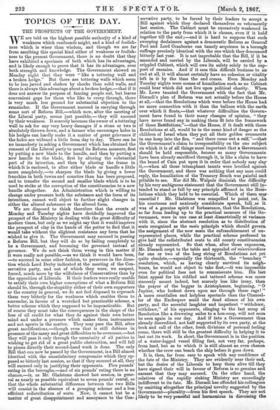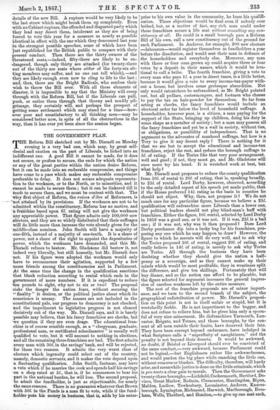TOPICS OF THE DAY.
THE PROSPECTS OF THE GOVERNMENT.
WE are told on the highest possible authority of a kind of weakness which confounds might, and a kind of foolish- ness which is wiser than wisdom, and though we are far
from ascribing this special kind either of weakness or foolish- ness to the present Government, there is no doubt that they have exhibited a specimen of both which has its advantages, and is likely enough to prove that it has its advantages, over both strength and knowledge. The Government showed on Monday night that they were " like a tottering wall and a broken hedge." But there are tottering walls which seem to be less jarred and shaken by shocks than solid walls, and
there is always this advantage about a broken hedge,—that if it
does not answer its purpose of. fencing people oat, but leaves convenient gaps for those who like to creep through, there
is very much less ground for substantial objection to the
remainder. If the Government succeed in carrying through some sort of Reform Bill,—which now, after the meeting of the Liberal party, seems just possible,—they will succeed
by their weakness. It scarcely becomes the owner of a tottering wall to ask for any very heavy damages if a stone or two is
absolutely thrown down, and a farmer who encourages holes in his hedges can hardly make it a matter of great grievance if the holes are widened a little from day to day. There can be no immodesty in asking a Government which has obtained the consent of the Liberal party to mend its Reform measure, first by putting a new blade to the handle, and then by putting a new handle to the blade, first by altering the substantial
part of its intention, and then by altering the frame in which it is enclosed, to alter either blade or handle a little
more completely,—to sharpen the blade by giving a lower franchise in both towns and counties than has been proposed, and to transfer the second and smaller blade which is to be used to strike at the corruption of the constituencies to a new handle altogether. An Administration which is willing to change under pressure both the substance and the form of its intentions, cannot well object to further slight changes in either the altered substance or the altered form.
We are disposed to think therefore that the events of Monday and Tuesday nights have decidedly improved the prospect of the Ministry in dealing with the great difficulty of modern times, but only as we might say that it would improve the prospect of clay in the hands of the potter to find that it would take without the slightest resistance any form that he wished to give it. The Government may succeed in passing a Reform Bill, but they will do so by failing completely to be a Government, and becoming the governed instead of governor. We do not think them wrong in this matter if it were really not possible,—as we think it would have been, —to succeed in some other fashion, to persevere in the direc- tion which Lord Derby indicated at the meeting of the Con- servative party, and out of which they were, we suspect, forced, much more by the wilfulness of Conservatives than by the opposition of Liberals. If their leaders were really unable to satisfy their own higher conceptions of what a Reform Bill should be, through the stupidity either of their own supporters or the country in general, we do not feel disposed to reproach them very bitterly for the weakness which enables them to surrender, in favour of a wretched but practicable scheme, a better scheme which they supposed to be impracticable. But of course they must take the consequences in the shape of the loss of all credit for what they do against their own better mind and under a pressure which makes them instruments and not agents in the matter. They may pass the Bill, after great modifications,—though even that is still dubious in presence of the many and great difficulties to be overcome,—but they will pass it only through the unanimity of all parties in wishing to get rid of a great public obstruction, and will fall
to pieces directly their second-hand work is done. The only Bill that can now be passed by the Government, is a Bill almost identical with the unsatisfactory compromise which they op- posed so bitterly last session, so that if they succeed at all, they will succeed only in justifying their opponents. Five pounds'
rating in the boroughs,—and of six pounds' rating there is no chance,—is, as Mr. Gladstone showed last session, in gene-
ral as nearly as possible equivalent to seven pounds' rental, so that the whole substantial difference between the two Bills will consist in the absence of a grouping scheme and a less efficient redistribution of seats. Now, it cannot but be a matter of great disappointment and annoyance to the Con- servative party, to be forced by their leaders to accept a. Bill against which they declared themselves so vehemently last session. The Cabinet must be excessively weakened in relation to the party from which it is chosen, even if it hold together till the end ;—and it is hard to suppose that such sweeping declaimers against a democratic Reform as Genera/ Peel and Lord Cranborne can tamely acquiesce in a borough suffrage precisely identical with the one which they denounced bitterly last year. It is not improbable that the Bill, if it be amended and carried by the Liberals, will be carried by a crippled Cabinet, which will owe its safety solely to the sup- port of enemies. And if it sees this difficult business to an end at all, it will almost certainly have no cohesion or vitality left in it by the time the end comes. Even Monday and Tuesday nights were scenes of humiliation such as no Cabinet; could bear which did not live upon political charity. When Mr. Lowe taunted the Government with the fact that Mr. Disraeli's plan of Reform was not actually before the House at all,—that the Resolutions which were before the House had no more connection with it than the balloon with the earth. over which it floats,—that whatever difficulties the Govern- ment have found in their many changes of opinion, " they have never found any in making them fit into the framework of these Reitifttions,"—that the House, if it dealt with these Resolutions at all, would be in the same kind of danger as the children of Israel when they put all their golden ornaments in one heap into the fire, " and there came out a calf,"—that the Government's claim to irresponsibility on the one subject on which it is of all things most important that a Government should be held responsible, because so many Governments have been already sacrificed through it, is like a claim to have- the brand of Cain put upon it in order that nobody may slay it, —when all these triumphant taunts were levelled against the Government, and there was nothing that any man could reply, the humiliation of the Treasury Bench was painful andi pitiable to see. Nor did Mr. Walpole diminish the difficulty by his very ambiguous statement that the Government still in- tended to stand or fall by any principle affirmed in the Reso- lutions which they held to be essential. Which of them was
Mr. Gladstone was compelled to point _out, in,
his courteous and anxiously considerate speech, full as it was of a genuine spirit of forbearance, that the Resolutions,. so far from leading up to the practical measure of the Go- vernment, were in one case at least diametrically at variance with it, since the abstract resolution as to distribution of seats recognized as the main principle which should govern. the assignment of the new seats the enfranchisement of un• represented places, while the practical scheme professed to
give half the redistributed seats to old county constituencies
already represented. So that when, after these exposures,. Mr. Disraeli crept to the table and appealed ad misericordianz for one or two of the long string of Resolutions not yet quite obsolete,—especially the thirteenth, the "boundary " resolution, which, as having clearly survived its neigh- bours, he would not object to take first, it was impossible even for political foes not to commiserate him. His last
faint appeal for his riddled and tattered scheme was more sincerely meant indeed, but scarcely less like irony, than the prayer of the beggar in Aristophanes, beginning, " 0 Jupiter, who lookest down upon me through these rags! " A more crestfallen and helpless spectacle than the Chancel- lor of the Exchequer amid the dead silence of his ,own party, and the scornful laughter and impatient " withdraw, withdraw," of his opponents, clinging to the last scrap of Resolution like a drowning sailor to a hen-coop, will not soon be seen again in our day. And if into a Government thus already discredited, not half supported by its own party, at the beck and call of the other, fresh divisions of personal feeling come, there will still be the greatest difficulty in helping it to last out its work. In short, the Government is in the position of a water-logged vessel filling fast, not very far, perhaps, from land, but as to which it is still almost an even chance whether the crew can beach the ship before it goes down.
It is, then, far from easy to speak with any confidence of
the fate of the Ministry. They are evidently near their end, but the desire of the Liberals to keep them alive till they have signed their will in favour of Reform is so genuine and earnest that they may succeed. On the other hand, the relatives of the rapidly sinking Ministry are exceedingly indifferent to its fate. Mr. Disraeli has offended his colleagues by omitting altogether the principal novelty suggested by the Government—plurality—from his first speech. They are not likely to be very peaceful and harmonious in discussing the details of the new Bill. A rupture would be very likely to be 'the last straw -which might break them up completely. Even with no Cabinet rupture, the offended and disgusted party which they lead may desert them, intolerant as they are of being forced to vote this year for a measure as nearly as possible identical in effect with the one which they denounced last year in the strongest possible speeches, some of which have been just republished for the British public to compare with their present conduct. Then there are the thirty owners of the -threatened seats,—indeed, fifty-three are likely to be en- dangered, though only thirty are attacked (for twenty-three out of the thirty are seats where either of the forty-six sit- ting members may suffer, and no one can tell which),—and they are likely enough even now to cling to life to the last ; and, then, there are the Bright Radicals, who confess their -wish to throw the Bill over. With all these elements of disaster, it is impossible to say that the Ministry will creep -through with the Reform Bill, but if the Liberals can pull, push, or entice them through that thorny and muddy pil- grimage, they certainly will, and perhaps the prospect of getting some settlement which may stand for a time—how- ever poor and unsatisfactory to all thinking men—may be considered better now, in spite of all the obstructions in the way, than it has ever yet been since the session began.































 Previous page
Previous page